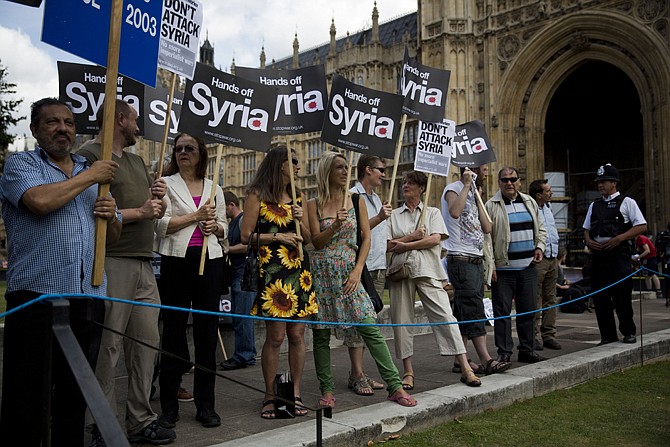DAMASCUS, Syria (AP) - President Bashar Assad vowed Thursday that "Syria will defend itself" against Western military strikes over a suspected chemical weapons attack, and the U.N. said inspectors will leave within 48 hours carrying information that could be crucial to what happens next.
British Prime Minister David Cameron argued strongly for military intervention in Syria but was rejected in a preliminary vote in Parliament, while French defense officials said openly for the first time that their military is preparing for a possible operation. The Obama administration was briefing congressional leaders about its case for attacking Syria.
The U.S., Britain and France blame Assad's regime for the alleged chemical weapons attack Aug. 21 on rebel-held suburbs of Damascus. The Syrian government denies the allegations, saying rebels staged the attack to frame the regime.
At the United Nations, a meeting of the permanent members of the Security Council on the Syrian crisis ended after less than an hour after being convened by Russia, a staunch ally of the Assad regime.
As Western leaders made their case at home for intervening in Syria's 3-year-old civil war, Assad remained defiant.
"Threats to launch a direct aggression against Syria will make it more adherent to its well-established principles and sovereign decisions stemming from the will of its people, and Syria will defend itself against any aggression," he said in comments reported by the Syrian state news agency.
It's not clear whether Assad would retaliate against any attacks or try to ride them out in hopes of minimizing the threat to his continued rule. The U.S. has said regime change is not the objective of any military action it may carry out.
The U.N. experts have been carrying out on-site investigations this week to determine whether chemical weapons were used in the attack that the group Doctors Without Borders says killed 355 people. Inspectors visited the eastern suburb of Zamalka, where they interviewed survivors and collected samples.
U.N. Secretary-General Ban Ki-moon urged Western powers to hold off on any military action until the experts can present their findings to U.N. member states and the Security Council. Speaking in Vienna, Ban said the U.N. team is to leave Syria on Saturday morning and will immediately report to him. He also said that he spoke to President Barack Obama about ways to expedite the U.N. probe.
Some of the experts will take samples to laboratories in Europe after leaving Damascus.
In a stunning defeat Thursday night, Cameron's government lost a preliminary vote calling for military strikes. Although nonbinding, the rejection means Cameron's hands are tied and he released a terse statement to Parliament saying it was clear to him that the British people did not want to see military action.
The vote lost 285-272 and the prime minister said he would respect the will of the House of Commons.
At the start of the week, Cameron had seemed ready to join Washington in possible military action against Assad. But the push for strikes against the Syrian regime began to lose momentum as Britain's Labour Party announced its opposition to the move.
Click here if video of British Parliament preliminary vote fails to load automatically.

